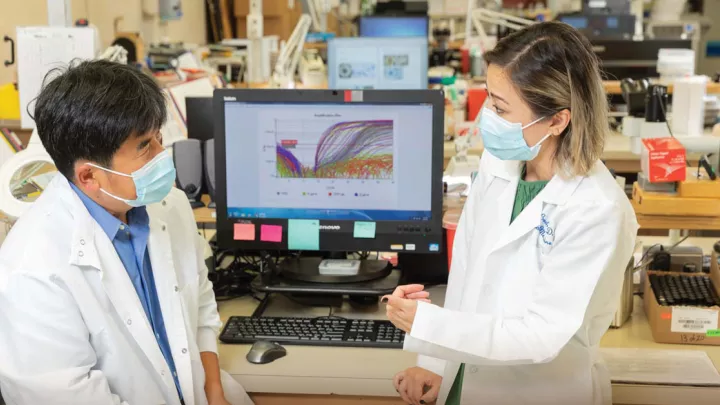Research Topics
Improving the evidence base for inpatient care provided to children with medical complexity, including but not limited to:
- Describing the microbial environment of cerebrospinal fluid (CSF) shunt infections
- Determining risk factors and optimizing treatment for CSF shunt infections and re-infections
- Improving surgical decision-making to prevent CSF shunt infection
- Identification and characterization of healthcare utilization by children with medical complexity
Research Overview
Our study team is driven by a talented group of research staff and collaborating sites who address translational, clinical and health services research projects. We are committed to improving the quality of evidence in the inpatient health care provided to children with medical complexity.
The laboratory of Tamara D. Simon, MD, MSPH, focuses on cerebrospinal fluid (CSF) shunt infections and re-infections in children with hydrocephalus.
In 2009, Dr. Simon obtained a K23 career development award from the National Institute of Neurological Disorders and Stroke. The grant allowed her to conduct multicenter studies to determine risk factors for CSF shunt infections through the Hydrocephalus Clinical Research Network, expanding upon similar work conducted using single center data and multicenter administrative databases.
While finding relatively few patient factors are associated with risk for first CSF shunt infection, we have learned that implementing a standardized surgical protocol reduced CSF shunt infection rates. The team is now pursuing the effectiveness of intrathecal antibiotics and antibiotic impregnated shunt catheters in preventing post-surgical CSF shunt infection. A grant to investigate this question using the PHIS+ database (PHIS+ Shunt Infection Prevention) is being supported through a R01 grant from the National Institute of Neurological Disorders and Stroke.
Our team’s subsequent translational line of inquiry has focused on the microbial environment of CSF shunt infections. With new collaborators, we have described wide bacterial and fungal diversity in the CSF of children with CSF shunt infections, and are actively investigating the presence of biofilms on shunt apparatus. A grant to characterize the CSF microbiota across the time course of shunted hydrocephalus (Cerebrospinal FLuId MicroBiota in Shunts Study or CLIMB) is being supported through an R01 grant from the National Institutes of Neurological Disorders and Stroke.
Additionally, the team’s health service research focus is on improving the quality of care provided to children with medical complexity in the inpatient setting. It is critical to accurately identify this vulnerable population of children to study and better understand where evidence gaps exist in their care and to inform the development of interventions to improve their care.
Dr. Simon was the scientific lead of the AHRQ-funded Working Group on Identification of Medically Complex Children in Administrative data, and a driving force for the development of the Center’s strategy to identify children with medical complexity in Medicaid administrative data. The resulting Pediatric Medical Complexity Algorithm (PMCA) identifies children with medical complexity with high sensitivity and specificity using hospital discharge or health plan administrative data. PMCA is now in use by multiple institutions both nationally and internationally. A grant investigating utilization by children with medical complexity in rural and urban settings was recently awarded to Dr. JoAnna Leyenaar at Dartmouth.
Current Funding
- The National Institutes of Neurological Disorders and Stroke
- National Institute on Minority Health and Health Disparities
- Southern California Clinical and Translational Science Institute
Completed Funding
- The National Institutes of Neurological Disorders and Stroke
- National Heart, Lung, and Blood Institute
- Patient-Centered Outcomes Research Institute
- Agency for Healthcare Research and Quality Centers for Medicare and Medicaid Services
- Center for Clinical and Translational Research at Seattle Children’s Research Institute
- Seeking Techniques in Advancing Research in Shunts
- Primary Children’s Medical Center Foundation
- Clinical Center for Translational Science Pilot Project at University of Utah
Data and Specimen Request
If you and your research team are interested in using the PHIS+ data please email your request to tsimon@chla.usc.edu. Please include the institution you are affiliated with as well as your contact information.
If you and your research team are interested in using our biospecimens repository please email your request to CSFMicrobiota@chla.usc.edu. Please include the institution you are affiliated with as well as your contact information



